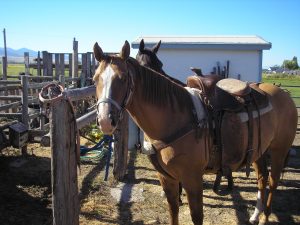Growing up on a farm, every day was a different story and a different lesson learned.

“Now we’re makin’ bag,’ Grandpa said, looking at the field mostly cleared of rocks. For the time being.
“What does that mean?’ 7-year-old me asked.
“It means when a cow is getting ready to calve, her udder starts producing milk and gets big. It’s a way of saying ‘we are making progress.’’ Grandpa replied.
Storytelling has progressed from an oral tradition to print to digital formats. With technology, stories can now reach beyond those circled around the campfire or those with money to buy books. Anyone with an internet connection and device can enjoy and learn from digital stories. The stories we create for entertainment or education can span the world. These stories can reach a student in the inner city who has never seen a cow or the farm kid in China who grew up with livestock.
As a teacher, there is always progress to be made. After taking this class, there are areas of my teaching where I can incorporate digital storytelling so student can make progress. The best example I can think of it using an interactive story in Paralegal Ethics to present an ethical dilemma that students may encounter in their career. This story would have different responses a student can choose from and they can retrace a path to arrive at a different ending. Depending on where they end the story, I can assess if they understood the material from the lesson and applied it to their choices. Student can achieve a better understanding of the material by being able to repeat the story to see all possible endings.
My storytelling can continue as I create new and update existing fact scenarios for the substantive law courses. I know in my Family Law course, I need to move away from “traditional’ family scenarios and start incorporating stories of diverse family structures and their domestic relation situations. As a side note, I honestly did not know I was presenting only one aspect “family’ until I researched inclusive teaching for ED 653. I was shocked when I understood how my teaching was perpetuating stereotypes and my own biases.
From the student side, there are opportunities for students to be the storyteller. In Civil Procedure, students prepare an opening statement presentation for trial. Here they rely on the information they have obtained from the client, the investigation and discovery process, and overall theme of the case. There are tools other than PowerPoint available for them to create a dramatic, emotional, informative and persuasive story to present to the jury.
“So if we’re makin’ bag, do we need to pick rocks tomorrow?’ I asked. “It’s Sunday and we’ve been doing this forever.’
Grandpa looked down at me.
Uh oh, I thought. Shouldn’t have said anything. Grandpa’s not gonna let us have a break.
“We are making good progress. And you and your brother have been working harder than kids should sometimes. Tell you what. We’ll go for a ride up the Willoughby tomorrow for a few hours.’

Feature image photo by Ullash Borah on Unsplash

I love the return of your rocks in the field metaphor. Thanks for bringing us full circle with a whole new meaning.